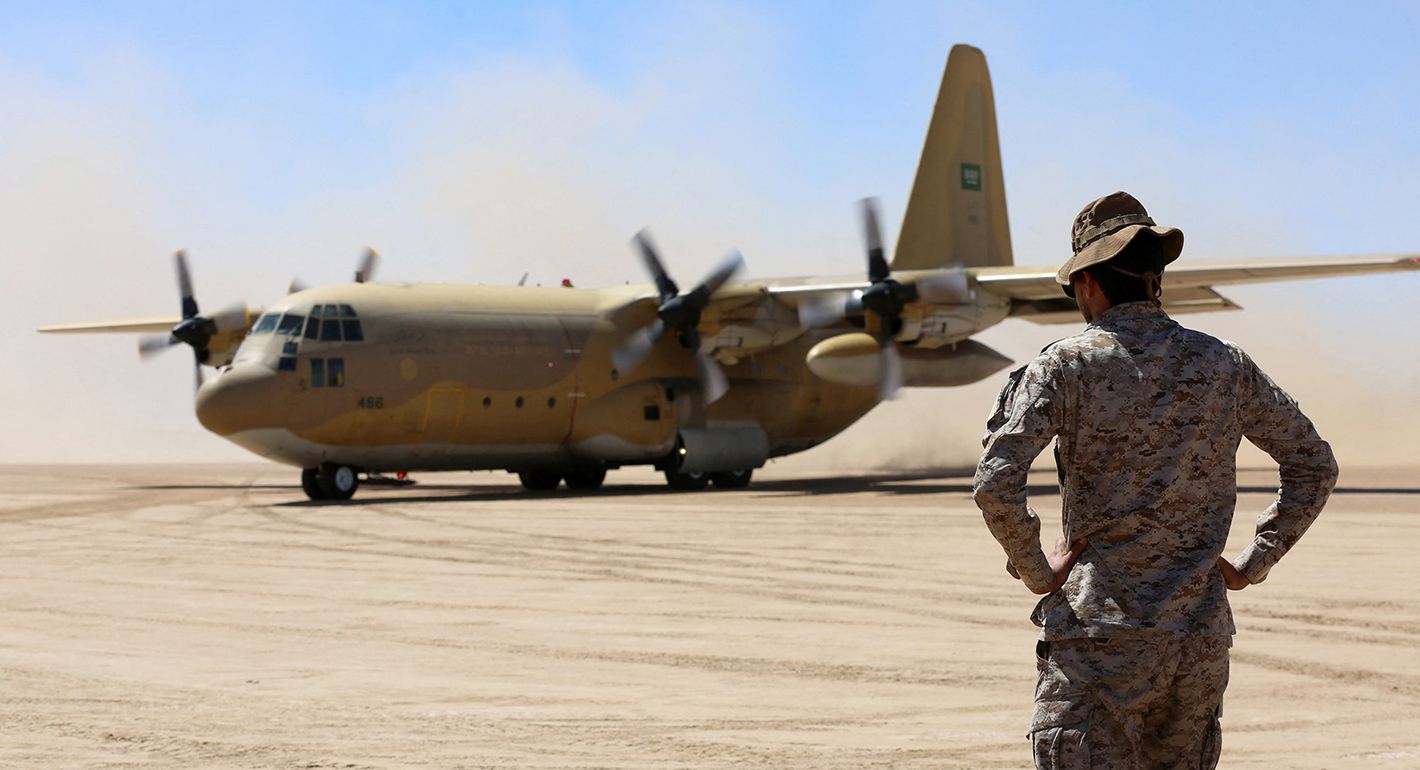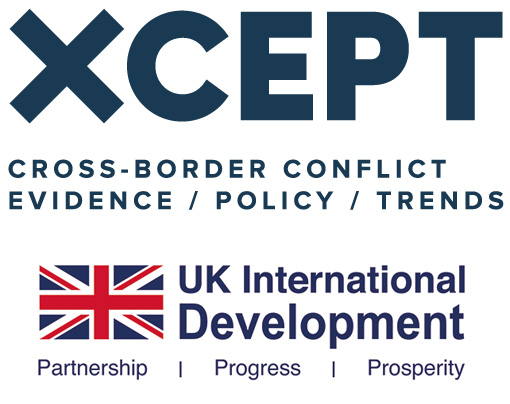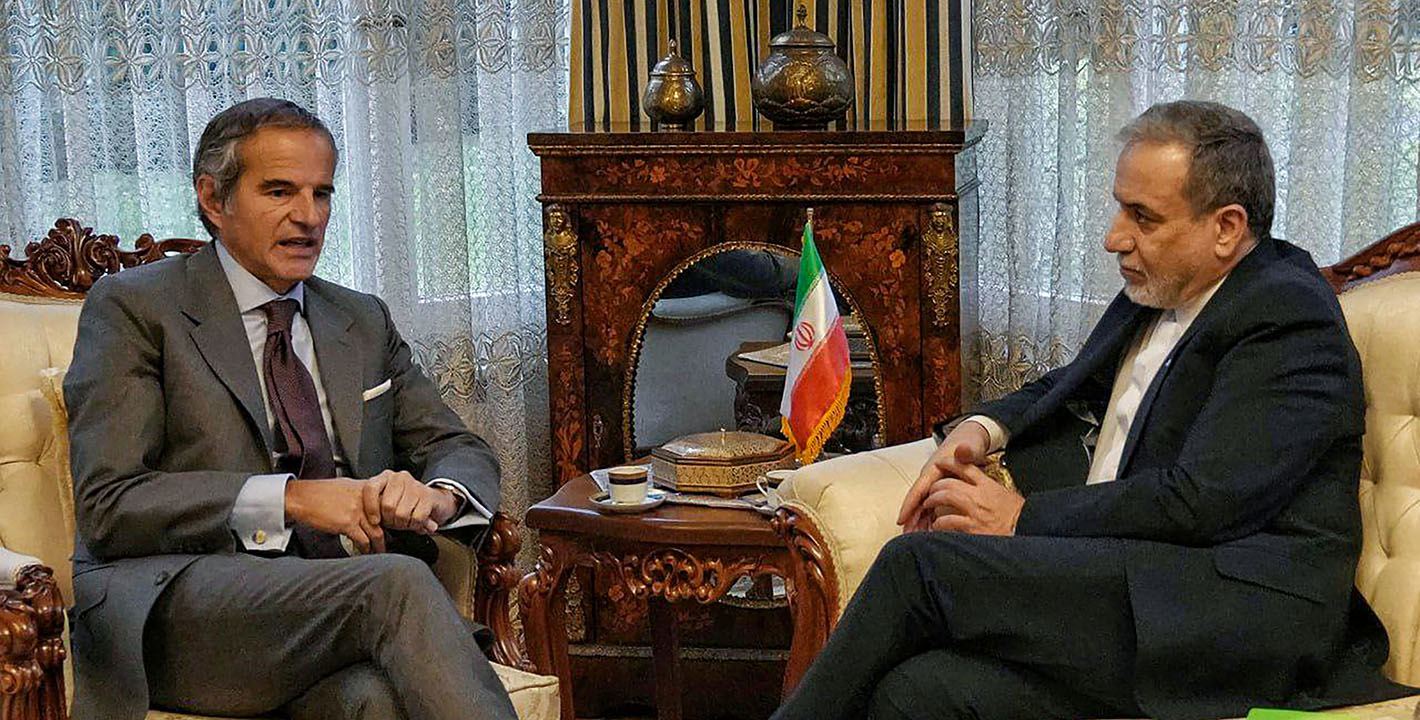Abdullah Baabood

Source: Getty
How Gulf States Are Reinterpreting National Security Beyond Their Land Borders
Gulf states such as Saudi Arabia and the UAE have determined that their national security goes beyond their physical borders. It is just as important to shield their airspace, territorial waters, and even maritime trade routes.
Introduction
The October 7 attack by Hamas on Israel and the latter’s subsequent months-long and ongoing assault on the Gaza Strip have drastically redefined the security considerations of the Gulf Cooperation Council (GCC) states. Iran’s unprecedented missile and drone strikes on Israel, launched in retaliation for an Israeli bombing of the Iranian embassy complex in Damascus, sent a clear message to regional countries of Tehran’s military reach. Despite a relatively successful rapprochement between Iran and the Gulf states following the Chinese-brokered Saudi-Iranian reconciliation agreement in March 2023, the Iranian attack on Israel alarmed the Gulf states. Although Tehran reportedly disclosed the scope of the operation to its Gulf neighbors before its launch, its scale and nature forced these countries to reassess their security priorities.
At issue is the realization that, in an evolving security landscape, securing one’s territorial borders no longer suffices when it comes to guarding against potential threats. National security requires additional measures. Chief among them are protecting airspace and maritime zones, entering into transnational defense arrangements, and investing in drone and surveillance technology.
Nonetheless, such efforts can go only so far—particularly once hostilities have erupted. Indeed, another round of Iran-Israel fighting would pose significant challenges to the GCC, particularly if Washington is drawn into the conflict. To navigate these evolving security challenges to their borders and sovereignty, the GCC states face a difficult task. They must strike a balance between their recent diplomatic rapprochement with Iran, their ongoing efforts to develop a loose regional security framework that includes Israel and the United States, and their new politico-economic gravitation toward China and, to a lesser extent, Russia.
Half a Decade of Mounting Security Concerns
The Israel-Iran confrontation in 2024 was just one of several incidents in recent memory that unsettled Gulf countries and prompted them to rethink their geopolitical strategies, particularly with regard to the protection of borders. For the GCC states, the loss of U.S. support for the Saudi-led war against Ansar Allah in Yemen, together with the continued and multifaceted threat posed by the Iran-backed Yemeni militia, created the perception of a diminishing U.S. security umbrella in the region. (Though occurring farther afield, the chaotic U.S. military withdrawal from Afghanistan also caused jitters in the Gulf.) Saudi Arabia, the United Arab Emirates (UAE), and Qatar, all of which had long viewed the United States as a key security guarantor, realized that they had to adapt to a new situation.
Yemen-related developments occasioned a moment of revelation when, in response to the Saudi-led coalition’s participation on the side of its adversaries in the Yemeni civil war, Ansar Allah launched a drone attack on Saudi Arabia’s Abqaiq oil processing plant and Khurais oil field in 2019. Notably, this was met with a muted American response. Ansar Allah staged a similar operation against oil tanker trucks in Abu Dhabi in 2022. The perceived lack of robust U.S. support for Saudi Arabia in the aftermath of the 2019 attack, and for the UAE following the 2022 strike, prompted Riyadh and Abu Dhabi to reassess their reliance on external allies for security guarantees.
Even more significant was the U.S. administration’s change of policy vis-à-vis the Saudi-led coalition’s war against Ansar Allah. In February 2021, the United States withdrew its support for offensive operations carried out by the Saudis and their allies. This decision marked a reorientation of U.S. policy away from unconditional support for the coalition’s military campaign, which was subject to mounting criticism for causing civilian casualties and a humanitarian crisis. The withdrawal of U.S. backing placed pressure on Saudi Arabia to alter its approach to the conflict and seek a negotiated solution. The UAE had already changed course in 2019, largely limiting itself to cultivating political groups and militias in southern Yemen that would be beholden to Abu Dhabi. Today, in areas of Yemen that are not under the control of Ansar Allah, Saudi Arabia and the UAE are more involved in using Yemeni proxies to thwart each other’s designs than in joining forces to confront their ostensibly shared nemesis.
Nonetheless, Ansar Allah’s actions continue to cause trepidation in Saudi Arabia and the UAE. To dissuade countries from carrying on economic activity with Israel, even as the latter pulverizes the Gaza Strip, Ansar Allah has since October of last year launched attacks on several ships passing through the Red Sea. Most of these operations have taken place in the Babel-Mandeb strait, the southern maritime gateway to the Suez Canal and a key maritime chokepoint. Although Ansar Allah insists that it is targeting Israel-linked ships, as well as American and British warships, the group has attacked other vessels, affecting the interests of at least sixty-five countries. This has forced vessels to reroute and sail around South Africa’s Cape of Good Hope, adding up to two weeks to their journey. Continued and long-term disruption to the free flow of hydrocarbons, which pass through the Red Sea, would have a severe impact on global energy markets. This, in turn, would harm the economies of the GCC countries, which rely heavily on oil and gas revenues. Given their increasing participation in regional economic corridor megaprojects, which make much use of maritime shipping, the GCC states are especially keen to secure their waterways. In a sense, Saudi Arabia and the UAE have come to view Ansar Allah’s naval operations as more of a threat to their interests and security than the group’s control of much of Yemen.
For the Gulf countries as a whole, the recent Israel-Iran confrontation has reinforced the growing importance of air borders. While the Iranian retaliatory strikes on Israel did not directly threaten any GCC states, the latter were particularly concerned by Tehran’s utilization of Jordanian airspace, especially given that Jordan shares a border with Saudi Arabia. Israel and Jordan as well as U.S. and British military forces stationed in the region succeeded in intercepting 99 percent of the drones and missiles launched by Iran. This did not go unnoticed in the Gulf. The use of drones has become a feature of modern warfare due to their versatility, effectiveness, and ability to provide tactical advantages. The deployment of drones manufactured by Israel, Iran, Türkiye, and other countries in recent or ongoing conflicts, including Israel’s assault on Gaza and the border conflict between Hezbollah and Israel along the Lebanese-Israeli border, the Nagorno-Karabagh war between Armenia and Azerbaijan, the Libyan civil war, and the Russia-Ukraine conflict, demonstrates as much. The latest exchange between Israel and Iran has further cemented the importance of drones and counter-drone systems in Middle East border-security considerations.
The hostilities between Iran and Israel have also once again drawn attention, even if indirectly, to the issue of nuclear weapons proliferation in the Middle East. Though neither country has officially acknowledged any possession of nuclear arms, Israel is widely believed to have a nuclear arsenal, whereas Iran is said to be only weeks away from the ability to develop a nuclear weapon. Saudi Crown Prince Mohammed bin Salman has warned that, should Iran assemble a nuclear bomb, his country would also seek to acquire such weapons. The emergence of a nuclear arms race in the Middle East could prove catastrophic, with widespread global security implications and severe economic consequences. For the GCC states, it would seriously undermine an ongoing transition away from dependence on hydrocarbons, given that resources earmarked for sustainable development initiatives could well be diverted to nuclear technology, and also undo the recent progress made in reducing tensions with Iran.
In theory, deepening their security ties with Israel and the United States would grant the GCC states access to a wider regional security umbrella to deal with the perceived threat posed by Iran and its proxies. The UAE and Bahrain had already normalized relations with Israel before the Israel-Iran flare-up, and it is no secret that Saudi Arabia is negotiating a security pact with the United States in exchange for Saudi recognition of Israel. However, an outright alliance with Israel on the part of the GCC would increase the risk of being targeted by Iran and Iran-aligned groups in the region. Indeed, it is telling that the Gulf states refrained from taking sides in the Iran-Israel confrontation, instead urging mutual restraint.
How the Gulf States Have Responded to Security Challenges
The Gulf states remain, at least for now, reliant on Washington as a security guarantor. Most GCC countries host U.S. military bases and remain overwhelmingly dependent on the United States for arms. Nevertheless, the lack of a vigorous U.S. response to the Ansar Allah attacks on Saudi Arabia and the UAE pushed both countries to hedge against their traditional reliance on Washington’s security umbrella, particularly when it comes to protecting their airspace and waterways. This has included deepening relations with emerging powers such as China, exploring increased cooperation with Russia, and bolstering regional alliances. The Gulf states have also intensified efforts to enhance their own military capabilities and defense infrastructure. This includes investments in advanced weaponry, military technology, and the development of indigenous defense industries. The recent confrontation between Israel and Iran will only hasten these processes.
The GCC’s recent New Vision for regional security cooperation throws into relief the Gulf states’ growing inclination to take security into their own hands. The proposed plan aims to enable all six GCC member states to more effectively protect and manage their borders. Tangible components of the vision include joint military exercises, shared intelligence platforms, and integrated defense structures. By prioritizing regional security and stability, fostering strategic partnerships, and safeguarding vital economic resources and energy supplies, the GCC aims to reduce dependency on external security actors. However, the effectiveness of this initiative in enabling GCC countries to fully take security into their own hands will depend on the operational integration of border-security measures, political unity among member states, and the ability to adapt swiftly to evolving security threats in the region.
Alongside such homegrown attempts at fashioning a regional security architecture, several Gulf states have begun investing significantly in their own defense industries, often through partnerships with major defense conglomerates—such as Türkiye’s drone manufacturer Baykar—to boost their local arms manufacturing capabilities. Saudi Arabia, the UAE, and Qatar have all signed deals for the purchase of Turkish Bayraktar drones, which include joint production and technology transfer. Additionally, Saudi Arabia’s Advanced Communications and Electronics Systems Co. inked an agreement with China Electronics Technology Group Corp. for the joint design and manufacturing of drones in the kingdom. And the UAE signed an agreement with China’s National Aero-Technology Import & Export Corporation to purchase a fleet of L-15 advanced jet trainers. Furthermore, both Qatar and the UAE have purchased French Rafale fighter aircraft, with Saudi Arabia reportedly considering making its own purchase. Border surveillance systems are another area of focus for these countries. A recent agreement between Alat, a subsidiary of Saudi Arabia’s Public Investment Fund, and China’s Dahua Technology will see the manufacture of surveillance hardware in Saudi Arabia. Similarly, the UAE has invested in locally manufactured drones with surveillance capabilities while also collaborating with Israel to jointly develop an advanced system that can intercept drones and other aerial threats.
The United States’ decision to cease supporting offensive operations on the part of the Saudi-led Arab coalition in Yemen had a major and almost immediate effect on how Riyadh prosecuted the war in that country. It also reinforced the sentiment in Abu Dhabi that its “strategic redeployment” in 2019, which included handing over certain military positions to the Saudis and pulling back from direct confrontation with Ansar Allah, was the right move. Crucially, however, despite having tamped down their involvement in the war against Ansar Allah, both Saudi Arabia and the UAE—oftentimes in competition with each other as well as with Ansar Allah itself—are continuing their attempts to exert control over Yemen’s coastlines. Both countries have come to view regional maritime trade routes, including those extending beyond their territorial waters, as strategic borders encompassing their desired spheres of influence—the protection of which is essential for their economic and geopolitical interests. To that end, Abu Dhabi and Saudi Arabia have funded and overseen infrastructure development in key Yemeni ports (including the islands of Socotra and Mayyun/Perim) as well as along the Horn of Africa, working with internationally recognized governments and local militias. The more this view of regional trade routes as extensions of their national borders takes hold, the more Saudi Arabia and the UAE will consider supervision and even control of ports on the Red Sea and the Gulf of Aden as critical to enhancing their national security and protecting their economic interests.
On the international stage, several developments signal shifting security dynamics. The signing of a military cooperation agreement between Saudi Arabia and Russia in August 2021, followed by the rare visit of Russian President Vladimir Putin to Riyadh and Abu Dhabi in December 2023, showed that there was scant appetite in the Gulf for shunning Russia. Indeed, the GCC has pointedly remained neutral in the Russia-Ukraine conflict, refusing to impose sanctions on Moscow. Similarly, Saudi Arabia’s signing of a China-brokered reconciliation agreement with Iran, coupled with the alleged construction of a Chinese military base in the UAE, indicates enhanced Sino-Gulf relations.
Furthermore, despite criticism from the United States, the GCC supported the readmission of Syria to the Arab League in May 2023, seeking reconciliation with the government of President Bashar al-Assad. The GCC states’ normalization of relations with a regime aligned with Iran and Russia presents a challenge to U.S.-led efforts to ward off Iranian and Russian influence and may alter regional security alignments. The restoration of diplomatic ties with Iran itself also demonstrates a shift in policy by the Gulf countries amid the perceived absence of U.S. security guarantees. The move strains traditional U.S.-GCC alliances and complicates Washington’s efforts to isolate Tehran.
Nevertheless, it is important not to overstate the significance of these developments. The shift in the security dynamics of the GCC states represents a loosening, rather than a deterioration, of the GCC-U.S. security relationship. Despite reconciliation efforts with Iran and the so-called “Axis of Resistance”—the states and nonstate actors moving within Iran’s orbit—as well as closer cooperation with China and Russia, several GCC countries have deepened their bilateral relations with Israel, an endeavor facilitated by the United States. Moreover, the U.S. State Department approved the potential sale of Patriot missile interceptors to Saudi Arabia and Terminal High Altitude Area Defense missile interceptors to the UAE, indicating that defense links between Washington and both Riyadh and Abu Dhabi remain strong. The main takeaway from all this is that the Gulf countries are not hesitating to scale back aspects of their politico-military ties to the United States even as they maintain or enhance others, that they are increasing cooperation with Israel while avoiding an alliance with it, and that they are doing all this alongside a push to diversify their international partnerships. In an increasingly multipolar world order, the GCC states have, by necessity, become more flexible in their decisionmaking on both security matters and foreign policy.
Conclusion
The recent flare-up between Israel and Iran not only intensified security concerns in the Gulf but also accelerated the evolution of a conception of border security that had begun to change in 2019, when the Gulf states took note of a lackluster U.S. response to attacks by Ansar Allah on Saudi territory. Additionally, the confrontation between Israel and Iran underscored the interconnectedness of security threats across borders. Iran’s use of Jordanian airspace for its retaliation against Israel, together with Ansar Allah’s disruption of Red Sea shipping, reinforced the realization that border security extends beyond physical boundaries, and encompasses airspace, maritime routes, and cyberspace. For Saudi Arabia, the UAE, and Qatar, these developments highlight the importance of diversification of foreign and defense policies. Traditional alliances remain valuable, but even as the Gulf states maintain long-standing security agreements with the United States, some of them are looking to China for new security arrangements. Complementing this approach is the move toward bolstering inter-Gulf defense mechanisms. And all the while, the Gulf countries are investing in indigenous military industries, including border surveillance systems, unmanned drones, and cybersecurity.

About the Author

Former Nonresident Senior Scholar, Malcolm H. Kerr Carnegie Middle East Center
Abdullah Baabood was a nonresident senior scholar at the Malcolm H. Kerr Carnegie Middle East Center. Baabood holds the chair of the state of Qatar for Islamic area studies and is a visiting professor at the Faculty of International Research and Education at Waseda University in Tokyo.
- The Geopolitics of Economic Development in the Middle EastArticle
- The Future of the Gulf Cooperation Council Amid Saudi-Emirati RivalryArticle
Abdullah Baabood
Recent Work
Carnegie does not take institutional positions on public policy issues; the views represented herein are those of the author(s) and do not necessarily reflect the views of Carnegie, its staff, or its trustees.
More Work from Carnegie Endowment for International Peace
- How Far Can Russian Arms Help Iran?Commentary
Arms supplies from Russia to Iran will not only continue, but could grow significantly if Russia gets the opportunity.
Nikita Smagin
- Is a Conflict-Ending Solution Even Possible in Ukraine?Commentary
On the fourth anniversary of Russia’s full-scale invasion, Carnegie experts discuss the war’s impacts and what might come next.
- +1
Eric Ciaramella, Aaron David Miller, Alexandra Prokopenko, …
- Can the Disparate Threads of Ukraine Peace Talks Be Woven Together?Commentary
Putin is stalling, waiting for a breakthrough on the front lines or a grand bargain in which Trump will give him something more than Ukraine in exchange for concessions on Ukraine. And if that doesn’t happen, the conflict could be expanded beyond Ukraine.
Alexander Baunov
- Trump’s State of the Union Was as Light on Foreign Policy as He Is on StrategyCommentary
The speech addressed Iran but said little about Ukraine, China, Gaza, or other global sources of tension.
Aaron David Miller
- U.S. Aims in Iran Extend Beyond Nuclear IssuesCommentary
Because of this, the costs and risks of an attack merit far more public scrutiny than they are receiving.
Nicole Grajewski










